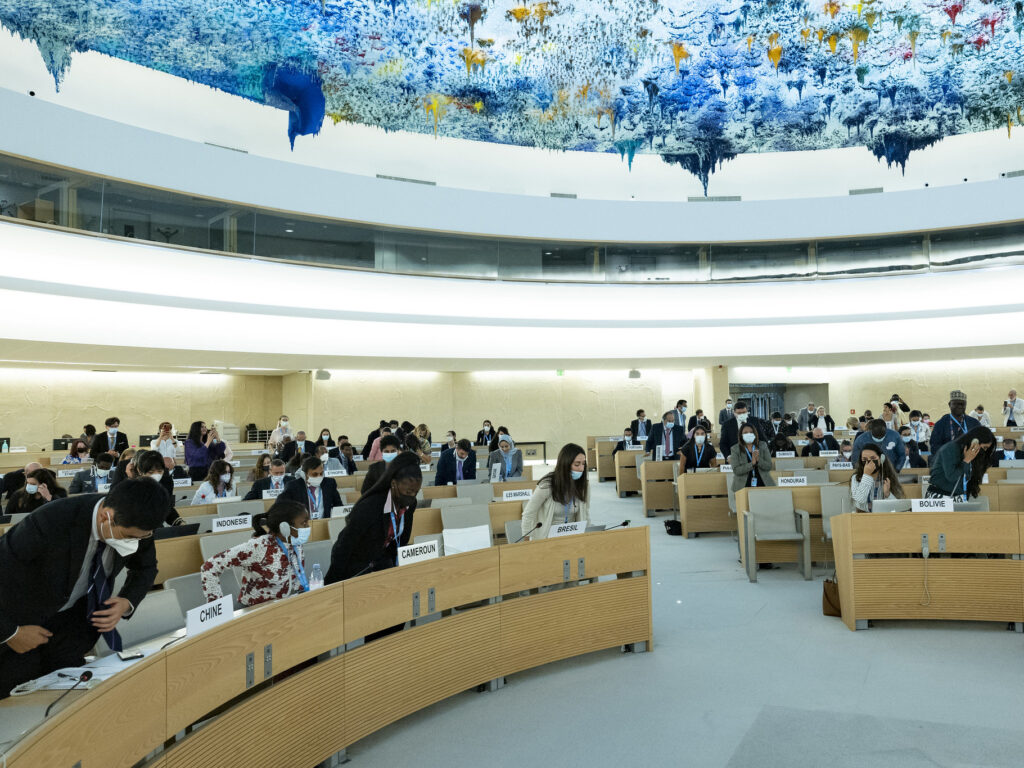During the session we shared various concerns from Franciscans and other partners with the Council. You can find all the statements that were delivered or co-sponsored by Franciscans International below.
● ● ●
Item 6: Universal Periodic Review outcomes of Haiti (1 July)
Haiti faces an unprecedented security crisis, manifested through kidnappings, the control of strategic territories by armed gangs, and political instability. While expressing our concerns in this joint statement, we also highlighted efforts to improve human rights situation and encouraged the State to implement the accepted recommendations as soon as possible and ensure their wide dissemination at the national level.
Item 6: Universal Periodic Review outcomes of Uganda (30 June)
We expressed our regret that Uganda only noted most of the recommendations made relating to the rights of freedom of expression and peaceful assembly, despite violations continuing across the country. Based on the testimonies gathered for our joint stakeholders’ submission ahead of Uganda’s examination, Franciscans International also raised the issue of female genital mutilation and encouraged the government to adopt a holistic approach in combatting this practice.
Item 3: Interactive Dialogue with the Special Rapporteur on the human rights of internally displaced persons (28 June)
During this Interactive Dialogue, we raised two largely underreported cases with the Human Rights Council. Since 2017, more than 700.000 people have fled terrorist attacks in Mozambique’s Cabo Delgado province. In the 2019 elections, most internally displaced persons (IDPs) were disenfranchised because their voter registration had not been transferred and returning to their place of origin was impossible. Meanwhile, the situation in West Papua, Indonesia, continues to be dire. There are only ten camps accommodating over 2.000 people who are unable or afraid to go home, as their villages have been destroyed or the presence of security forces has increased.
Panel on the adverse effects of climate change on human rights of people in vulnerable situations (28 June)
People who are disproportionally suffering from the negative impacts of climate change are also made more vulnerable by the lack of protection and sustainable solutions, with women being in particularly terrible situations. Indigenous people are likewise in vulnerable positions but at the same time hold vital knowledge and science through which key ecosystems have been protected or could be restored. In a joint statement, we asked the panel how best to ensure the meaningful participation of these agents of change.
Item 3: Interactive Dialogue with the Independent Expert on human rights and international solidarity (24 June)
Many local communities have had their human rights adversely impacted by transnational extractive companies as well as local operations that are part of global value chains. Irrespective of the scale of the activities, we often see widespread human rights violations and failed promises for development. An international legally binding instrument on business and human rights could be both as a tool for prevention and accountability. In a joint statement, we called on all States to engage proactively and in good faith in the current process toward such an instrument.
Item 3: Interactive Dialogue with the Special Rapporteur on the human rights of migrants (24 June)
The participation and support of armed forces in immigration control is a widespread practice across the Americas. In addition, pushbacks and mass expulsions have increased and immigration detention is no longer an exception. Human rights defenders working with migrants are targeted for their work. In a joint statement, we urged States to put an end to the use of armed forces for immigration control, respect the principle of non-refoulement, and suspend any measure that could put the life of people on the move at risk.
● Full statement (Spanish and English)
Item 3: Interactive Dialogue with the Special Rapporteur on human rights and climate change (23 June)
In a joint statement, we welcomed the first report of Mr Ian Fry to the Human Rights Council and expressed our high expectations for his mandate, as the latest reports and projections of the IPCC confirm the strong need to put human rights at the center of climate action. We also noted with interest the vision shared by the Special Rapporteur and were particularly encouraged to see climate-induced mobility and the role of business among his priorities for the first years of the mandate.
Item 3: Interactive Dialogue on the report of the Special Rapporteur on extrajudicial, summary or arbitrary executions (22 June)
In a joint statement, we encouraged the Special Rapporteur to monitor and investigate violations of the right to life in the context of drug policy. In particular, civil society organizations in the Philippines have documented thousands of suspected extra-judicial killings and enforced disappearances in the context of punitive policies and repressive, militarized anti-drug campaigns. These disproportionally affect racial and ethnic minorities, while perpetrators often enjoy impunity.

